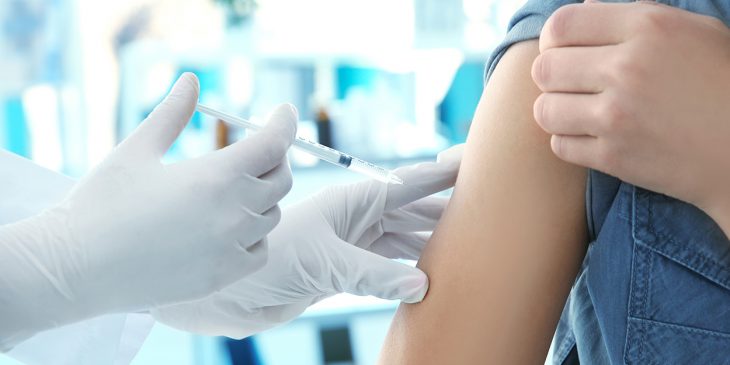In mid-August, longtime CBS Pittsburgh reporter and KDKA NewsRadio 1020 AM talk-show host Marty Griffin announced he was being treated for HPV-related throat cancer. At the same time, Griffin was launching his own consumer-focused website, Sparkt. He didn’t realize his personal cancer journey would become his first story.
Griffin consulted with a team of oncology experts at UPMC Hillman Cancer Center and then decided to go public with his diagnosis. His focus has been to convince parents that vaccinating their children against HPV now would prevent HPV cancer when they became adults. The vaccine has been shown to significantly decrease HPV infection and the cancers it causes. In fact, just this month, the U.S. Food and Drug Administration extended the age range for those who should receive the vaccine.
Dr. Robert Ferris, director of UPMC Hillman Cancer Center, is a head and neck oncology surgeon and immunologist. He is part of Griffin’s oncology team.
 We sat down with Dr. Ferris discuss the HPV virus and how it causes cancer.
We sat down with Dr. Ferris discuss the HPV virus and how it causes cancer.
What is HPV?
A. HPV is the human papillomavirus and is one of seven known viruses in the world that have been identified as causing cancer. There are more than 100 different types of HPV, and some lead to cervical cancer, as well as cancers of the head and neck, called oropharyngeal (throat) cancer. In many cases, HPV causes no symptoms. Signs of infection can appear weeks, months or even years after the person has been infected with the virus.
How does someone get HPV cancer?
A. About 20 million Americans are currently infected with HPV, and about 6 million more get infected each year. It’s a common virus and can be present for years without causing any symptoms at all. Interestingly, some HPV infections can go away on their own, but those that don’t often lead to cancer. We don’t know why some HPV infections cause cancer in some people and not in others. We do know that it’s transmitted through skin-to-skin contact with someone who has an HPV infection and usually through normal sexual contact. We also know that all cases of cervical cancer are derived from HPV, while about 70 percent of oropharyngeal cancer is caused by HPV.
What is the HPV vaccine and who should get it?
A. The FDA recently included new recommendations for those who should receive the HPV vaccine. When first recommended in 2006, the vaccine was approved for boys and girls between the ages of 9 and 12 and for those up to age 26. Now, due to the confirmed effectiveness of the vaccine, the FDA is recommending that men and women ages 27 to 45 also be vaccinated. It’s important to understand that the vaccine doesn’t prevent cancer itself, but it does prevent the HPV infection that can lead to cancer 10 to 20 years later. Extensive scientific research over the past 10 to 15 years has shown there are few serious side effects from the vaccine in the millions of people who have received it. Unfortunately, many continue to spread misleading information, causing many parents to question it or choose not to have their children vaccinated. I am often asked if my children are vaccinated. Yes, absolutely, because I am confident that the vaccine will save them from the risks of getting HPV-related cancers later in their lifetimes. Any slight risk of a vaccine side effect must be weighed again the terrible impact of cancer and it’s treatment effects. The vaccines have proven to be most effective if administered before a person becomes sexually active. This is why vaccination is recommended for children, who are already receiving a series of vaccines through routine well visits. Those parents who choose not to give their children the HPV vaccine are putting them at a much higher risk for developing cervical or oropharyngeal cancer when they become adults.
What is the treatment for HPV cancer?
A. Different types of HPV might cause different types of cancer, which are treated differently. When HPV develops into cancer, the standard treatment is surgery, sometimes followed by radiation and chemotherapy. Other times, chemo and radiation alone may be appropriate. An experienced, multi-disciplinary team of oncology specialists is necessary to make specific treatment decisions for each patient. The treatment typically lasts for several weeks and often produces side effects while the therapies work to stop the cancer cells from multiplying and growing.
What is the survival rate for HPV-related cancer?
A. Again, with different types of HPV infections causing different cancers, the survival rates depend on the type of cancer, stage of diagnosis and treatment. We know that most cervical cancers are caused by the HPV virus, and we know that HPV positive throat cancer has increased dramatically over the past five years and is also due to the HPV infection. The good news is both of these most common HPV-related cancers respond well to treatment and can have a high survival rate. But, protecting yourself against health-related problems, including cervical and throat cancer, is the real key. With a vaccine known to prevent HPV viral infections that cause cancer now available, we hope to see decreases in the number of HPV-related cancers in the future.








